Five Qingming Festival Poems
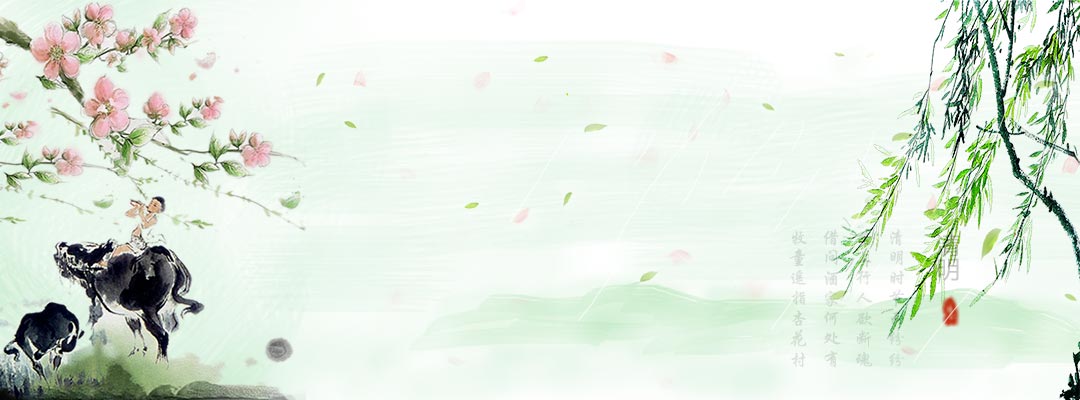
Qingming Festival is filled with contradictory emotions. Especially for the ancient poets, it is a day when it is easy to indulge in nostalgia. A number of poems about Qingming Festival have been created by them.
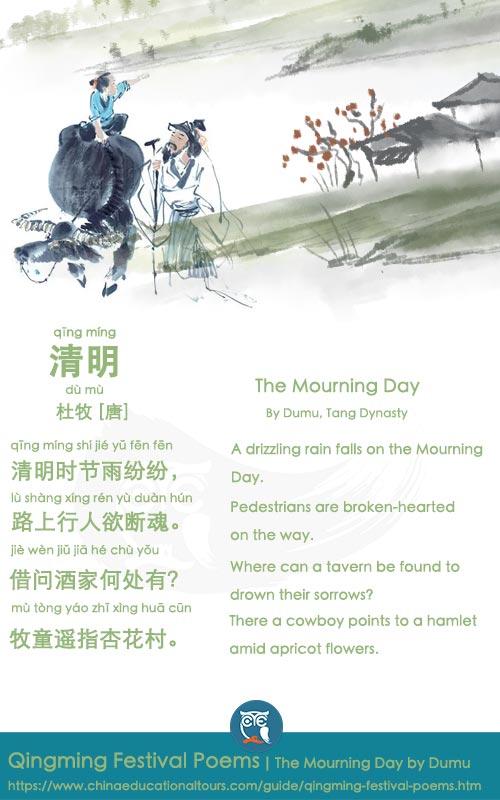
qīng míng
清明
The Mourning Day
dù mù
杜牧
By Dumu
qīng míng shí jié yǔ fēn fēn
清明时节雨纷纷,
A drizzling rain falls on the Mourning Day.
lù shàng xíng rén yù duàn hún
路上行人欲断魂。
Pedestrians are broken-hearted on the way.
jiè wèn jiǔ jiā hé chù yǒu
借问酒家何处有?
Where can a tavern be found to drown their sorrows?
mù tòng yáo zhǐ xìng huā cūn
牧童遥指杏花村。
There a cowboy points to a hamlet amid apricot flowers.
Good to Know: Du Mu, a poet in the Tang Dynasty (618-907), had the official position in the court. He was born into a noble family. His grandfather, Du You, was a compiler and a minister at the Tang court. Du Mu had a great ambition in his youth for his family background, but he never achieved a high rank. During Tomb-Sweeping Day, he felt so depressed that he could not bring honor to the family name when he called up memories of his ancestors.
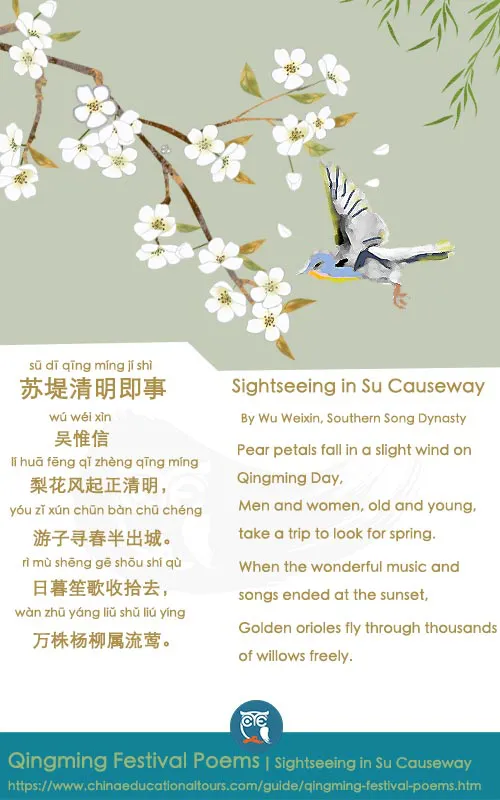
sū dī qīng míng jí shì
苏堤清明即事
Sightseeing in Su Causeway
wú wéi xìn
吴惟信
By Wu Weixin
lí huā fēng qǐ zhèng qīng míng
梨花风起正清明,
Pear petals fall in a slight wind on Qingming Day,
yóu zǐ xún chūn bàn chū chéng
游子寻春半出城。
Men and women, old and young, take a trip to look for spring.
rì mù shēng gē shōu shí qù
日暮笙歌收拾去,
When the wonderful music and songs ended at the sunset,
wàn zhū yáng liǔ shǔ liú yíng
万株杨柳属流莺。
Golden orioles fly through thousands of willows freely.
Good to Know: Wu Weixin was a poet in the Southern Song Dynasty, his poems feature detailed descriptions of scenery to express emotion.
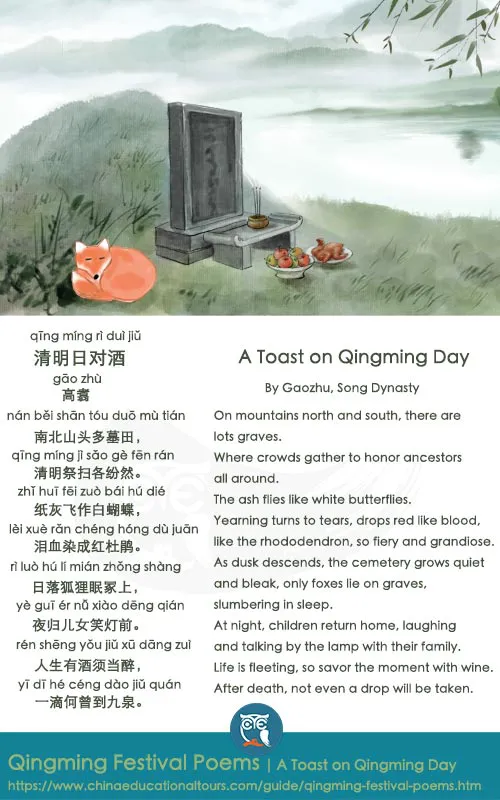
qīng míng rì duì jiǔ
清明日对酒
A Toast on Qingming Day
gāo zhù
高翥
By Gaozhu
nán běi shān tóu duō mù tián,qīng míng jì sǎo gè fēn rán
南北山头多墓田,清明祭扫各纷然。
On mountains north and south, there are lots graves.
Where crowds gather to honor ancestors all around.
zhǐ huī fēi zuò bái hú dié,lèi xuè rǎn chéng hóng dù juān
纸灰飞作白蝴蝶,泪血染成红杜鹃。
The ash flies like white butterflies.
Yearning turns to tears, drops red like blood, like the rhododendron, so fiery and grandiose.
rì luò hú lí mián zhǒng shàng,yè guī ér nǚ xiào dēng qián
日落狐狸眠冢上,夜归儿女笑灯前。
As dusk descends, the cemetery grows quiet and bleak, only foxes lie on graves, slumbering in sleep.
At night, children return home, laughing and talking by the lamp with their family.
rén shēng yǒu jiǔ xū dāng zuì,yī dī hé céng dào jiǔ quán
人生有酒须当醉,一滴何曾到九泉。
Life is fleeting, so savor the moment with wine.
After death, not even a drop will be taken.
Good to Know: Gaozhu (1170~1241), a poet in the Song Dynasty, he was an important figure in the Jiangnan poetic circle, known as a "Wandering literati". He was dedicated to poetry and was also famous for his paintings. In his later years, he fell into poverty and destitution, owning not even a single room or plot of land. He built a simple grass hut by the shore of the Shanglin Lake, barely enough for him to dwell in. He signed his works with the name "Xintianchao," meaning "The nest of an albatross". The albatross is often used as a symbol of freedom and wanderlust, as it spends much of its life soaring over the open sea. Symbolizes the freedom and adventurous spirit.
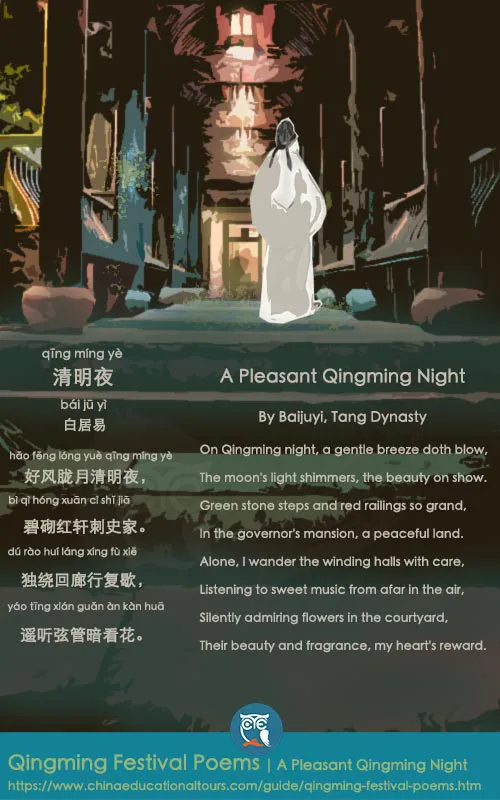
qīng míng yè
清明夜
A Pleasant Qingming Night
bái jū yì
白居易
By Baijuyi, Tang Dynasty
hǎo fēng lóng yuè qīng míng yè
好风胧月清明夜,
On Qingming night, a gentle breeze doth blow,
The moon's light shimmers, the beauty on show.
bì qì hóng xuān cì shǐ jiā
碧砌红轩刺史家。
Green stone steps and red railings so grand,
In the governor's mansion, a peaceful land.
dú rào huí láng xíng fù xiē
独绕回廊行复歇,
Alone, I wander the winding halls with care,
Listening to sweet music from afar in the air,
yáo tīng xián guǎn àn kàn huā
遥听弦管暗看花。
Silently admiring flowers in the courtyard,
Their beauty and fragrance, my heart's reward.
Good to Know: Bai Juyi's poem "A Pleasant Qingming Night" captures the essence of a springtime escapade during the Qingming Festival. In ancient times, this practice was known as "spring cleansing" or "looking for spring", and it flourished during the Jin Dynasty. The Qingming season is a perfect time to relish the beauty of spring, connect with nature, and set out for a refreshing excursion on the outskirts of town.
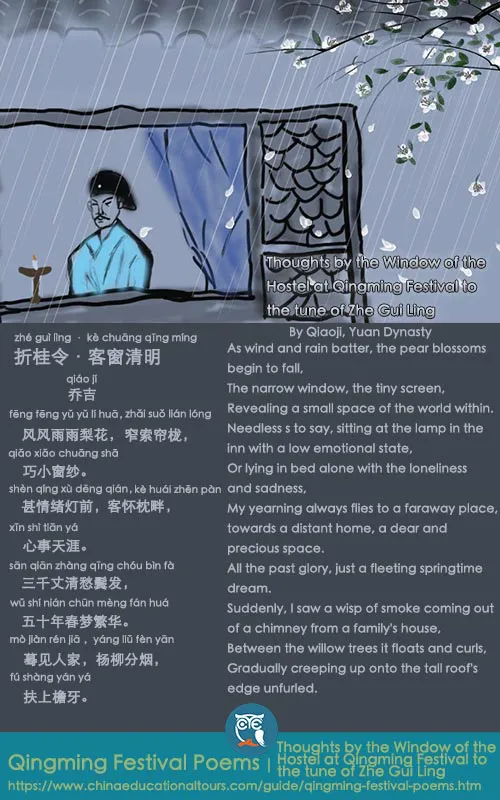
zhé guì lìng · kè chuāng qīng míng
折桂令·客窗清明
Thoughts by the Window of the Hostel at Qingming Festival to the tune of Zhe Gui Ling
qiáo jí
乔吉
By Qiaoji, Yuan Dynasty
fēng fēng yǔ yǔ lí huā ,zhǎi suǒ lián lóng ,qiǎo xiǎo chuāng shā
风风雨雨梨花,窄索帘栊,巧小窗纱。
As wind and rain batter, the pear blossoms begin to fall,
The narrow window, the tiny screen,
Revealing a small space of the world within.
shèn qíng xù dēng qián ,kè huái zhěn pàn ,xīn shì tiān yá
甚情绪灯前,客怀枕畔,心事天涯。
Needless s to say, sitting at the lamplight in the inn with a low emotional state,
Or lying in bed alone with the loneliness and sadness,
My yearning always flies to a faraway place, towards a distant home, a dear and precious space.
sān qiān zhàng qīng chóu bìn fà ,wǔ shí nián chūn mèng fán huá
三千丈清愁鬓发,五十年春梦繁华。
All the past glory, just a fleeting springtime dream.
mò jiàn rén jiā ,yáng liǔ fèn yān ,fú shàng yán yá
蓦见人家,杨柳分烟,扶上檐牙。
Suddenly, I saw a wisp of smoke coming out of a chimney from a family's house,
Between the willow trees it floats and curls,
Gradually creeping up onto the tall roof's edge unfurled.
Good to Know: Qiao Ji (c. 1280-1345) was a Yuan Dynasty playwright. He spent his life unappreciated for his talents and devoted himself to composing sanqu and zaju. "Zhe Gui Ling: Spending the Qingming Festival at the Window of an inn" depicts the loneliness and frustration of a wanderer living away from home. It can also be seen as a reflection of the author's own experiences of a restless life and emotional state.
Zhegui Ling, is a Qu Pai (a fixed melody used in traditional Chinese dramatic music). Kunqu music follows the "qupai" principle. To create this harmonious blend of music and poetry, the verses of the play are tailored to suit a specific sequence of tunes, known as "qu-pai," carefully selected from an existing repertoire. The libretto, in turn, must perfectly match the structure of the chosen "qu-pai," from the number of lines and syllables per line to the tonal sequence and rhyme scheme. It's a symphony of art, where every note and every word is meticulously orchestrated to produce a breathtaking performance.
OR
Are you eager to begin your Chinese cultural journey?
Drop us a line and we will promptly connect you with our leading China expert!
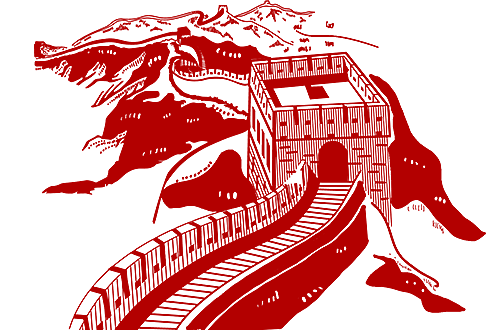 2 Poems about the Great Wall
2 Poems about the Great Wall 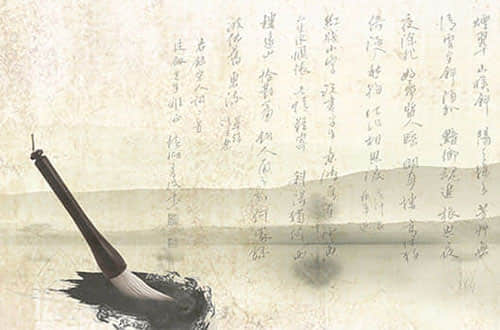 3 Chinese New Year Poems
3 Chinese New Year Poems 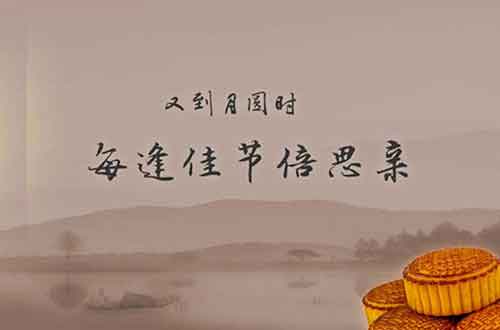 2 Popular Chinese Mid-Autumn Festival Poems
2 Popular Chinese Mid-Autumn Festival Poems  Chinese Poetry
Chinese Poetry